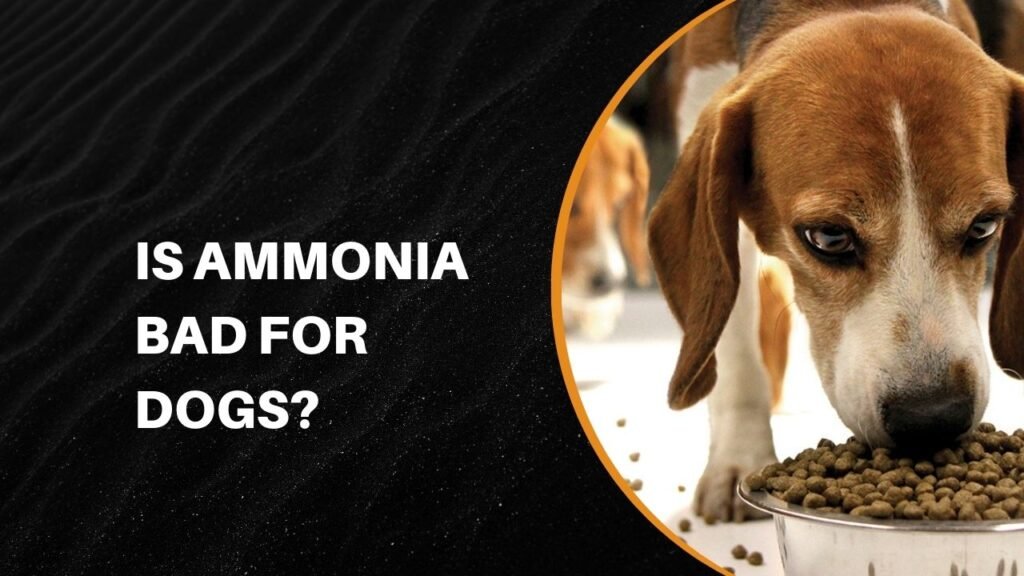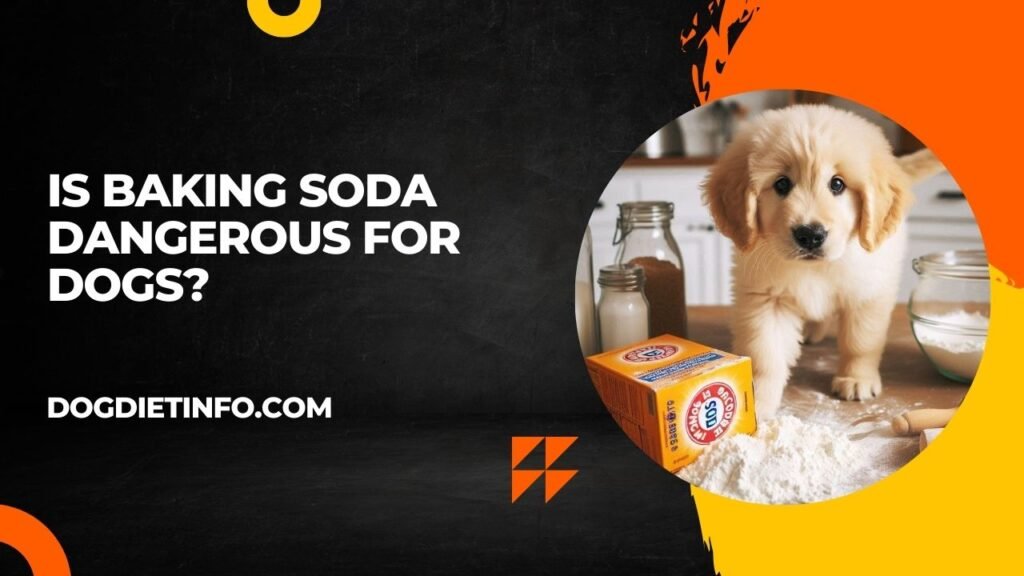Is Ammonia Bad For Dogs? Yes, ammonia is harmful to dogs. Exposure to ammonia fumes or ingestion can cause respiratory issues, eye irritation, and, in severe cases, lead to poisoning.
Ammonia is a common chemical with a wide range of uses, from household cleaning to industrial applications.
For pet owners, keeping dogs safe around common household chemicals is essential, but many may overlook the potential hazards posed by ammonia. Though often perceived as a harmless cleaner, ammonia can be particularly dangerous to dogs.
This article will dive into what ammonia is, the specific risks it poses to dogs, signs of ammonia poisoning, and how pet owners can prevent exposure to ensure a safe environment.
Contents
What Is Ammonia?
Definition and Properties
Ammonia is a naturally occurring compound composed of nitrogen and hydrogen, known for its sharp, distinctive odor.
It plays a significant role in both household and agricultural settings due to its effectiveness in cleaning and fertilizing. [Is Ammonia Bad For Dogs?]
In cleaning products, ammonia is valued for its ability to cut through grease and grime, especially on surfaces like glass and tile.
However, ammonia’s strong alkaline nature makes it a potent irritant, which can negatively impact any living creature that comes into contact with it.
Common Sources Around the Home
Ammonia can be present in multiple household items, even those that are used frequently. Here’s a look at some common sources where pet owners might encounter ammonia in their homes and environments:
- Household Cleaners: Ammonia-based cleaners are common in households due to their effectiveness in removing dirt, grease, and stains. Glass cleaners, multi-surface cleaners, and oven cleaners are just a few examples of products that may contain ammonia.
- Fertilizers: Ammonia is a major component in many fertilizers, particularly those used to provide nitrogen for plant growth. If a dog is allowed to roam freely in a garden or yard treated with ammonia-based fertilizers, they could be exposed to the harmful substance.
- Animal Waste: Ammonia is a byproduct of animal waste decomposition, particularly in situations where waste isn’t cleaned up frequently, such as in litter boxes or outdoor kennels. This makes it important for dog owners to regularly clean and maintain their pet’s living area.
Due to the wide range of sources of ammonia, it’s essential for pet owners to be vigilant and take steps to keep their dogs safe from exposure. [Is Ammonia Bad For Dogs?]
Even low levels of ammonia, such as the fumes from a freshly cleaned surface, can be harmful if a dog inhales or contacts them directly.
How Does Ammonia Affect Dogs?
Inhalation Hazards
One of the primary ways ammonia affects dogs is through inhalation. Dogs’ respiratory systems are particularly sensitive to airborne irritants due to their heightened sense of smell and increased exposure to ground-level chemicals.
Inhaling ammonia can irritate the lungs, throat, and nasal passages, leading to coughing, sneezing, and other respiratory symptoms.
Dogs with existing respiratory issues, such as asthma, allergies, or chronic bronchitis, are especially vulnerable to ammonia exposure and may experience exacerbated symptoms even at low levels.
Skin and Eye Irritation
Direct contact with ammonia can cause skin and eye irritation. Ammonia is a caustic substance, meaning it has the potential to cause burns or rashes upon contact.
Dogs with short or thin coats are more vulnerable to skin exposure, as the ammonia can reach their skin more easily. [Is Ammonia Bad For Dogs?]
Additionally, if ammonia fumes reach a dog’s eyes, it can cause tearing, redness, and pain, which may prompt the dog to rub their face or paw at their eyes, potentially worsening the irritation.
Ingestion Dangers
Ingesting ammonia, even in small amounts, is hazardous for dogs. They may accidentally ingest ammonia by licking a recently cleaned surface, drinking from a bucket of cleaning solution, or even nibbling on plants treated with ammonia-based fertilizers.
When ammonia enters the digestive system, it can cause a range of symptoms, from mild nausea and vomiting to severe gastrointestinal distress and internal burns.
Ammonia ingestion should be treated as a medical emergency, as it can lead to long-lasting damage if not addressed promptly.
Signs of Ammonia Poisoning in Dogs
Ammonia poisoning in dogs can present in various forms, depending on the amount and method of exposure. [Is Ammonia Bad For Dogs?]
Here’s a detailed look at the signs pet owners should monitor if they suspect their dog has been exposed to ammonia:
Mild Symptoms
- Respiratory Symptoms: Mild coughing, sneezing, or nasal discharge can indicate initial respiratory irritation. This may occur shortly after inhaling ammonia fumes, particularly in poorly ventilated spaces.
- Eye and Skin Irritation: Watery eyes, mild redness, and signs of itching may point to minor ammonia exposure. Dogs might paw at their faces or lick irritated areas, further intensifying the reaction.
- Lethargy: Some dogs may exhibit reduced energy levels and may appear less interested in their normal activities after mild exposure to ammonia. [Is Ammonia Bad For Dogs?]
Severe Symptoms
- Breathing Difficulties: Prolonged or intense exposure to ammonia fumes can lead to difficulty breathing, wheezing, or labored breathing. Dogs experiencing severe respiratory symptoms may pant excessively, struggle to take deep breaths, or exhibit open-mouth breathing.
- Gastrointestinal Distress: Vomiting, drooling, and loss of appetite are common signs if a dog ingests ammonia. Severe gastrointestinal distress can indicate damage to the digestive tract lining, which requires immediate veterinary care.
- Behavioral Changes: Uncharacteristic lethargy, aggression, or restlessness may signal that the dog is experiencing significant discomfort due to ammonia poisoning. Dogs might also whine, cry, or appear unusually anxious.
When to Seek Immediate Help
If your dog shows severe symptoms such as breathing difficulties, excessive vomiting, or behavioral changes, seek veterinary help immediately.
Quick intervention can make a critical difference in reducing the severity and long-term effects of ammonia exposure on your dog’s health.
Preventing Ammonia Exposure in Dogs
Safe Cleaning Practices
To prevent exposure, consider switching to ammonia-free cleaning products or those labeled as pet-safe. If ammonia-based cleaners are used, be sure to:
- Keep your dog in another room until the cleaning process is complete and the area is fully ventilated.
- Use fans or open windows to ensure proper airflow, which can help disperse ammonia fumes more quickly. [Is Ammonia Bad For Dogs?]
- Avoid using ammonia cleaners on surfaces your dog frequently contacts, like floors or countertops.
Storage Solutions
Always store ammonia-based products in secure, inaccessible locations, such as locked cabinets. Dogs are naturally curious creatures, and even containers with closed lids might pique their interest.
Store cleaning products on high shelves or inside cabinets to prevent accidental contact or ingestion.
Pet-Friendly Alternatives
Consider switching to natural, pet-safe alternatives like vinegar, baking soda, or enzyme-based cleaners.
These options can effectively clean surfaces without the risks associated with ammonia, and they’re generally safe for pets if they come into contact with them.
Enzyme-based cleaners are especially beneficial for pet owners, as they can remove stains and odors without posing health risks. [Is Ammonia Bad For Dogs?]
What to Do If Your Dog Is Exposed to Ammonia
If your dog has been exposed to ammonia, taking quick action can make a substantial difference. Here are some steps to follow based on the nature of the exposure:
Immediate Actions
- Inhalation: Move your dog to a well-ventilated area, preferably outside, to allow them to breathe fresh air. Monitor their breathing and watch for signs of respiratory distress, such as wheezing or labored breathing.
- Skin Contact: If ammonia contacts your dog’s skin, rinse the area thoroughly with lukewarm water for several minutes to remove the chemical. Avoid using soap or other products, as these might exacerbate irritation. [Is Ammonia Bad For Dogs?]
- Ingestion: If your dog has ingested ammonia, avoid inducing vomiting, as this can cause further harm. Instead, offer them a small amount of water to help dilute the substance and contact a veterinarian immediately for further guidance.
Veterinary Care
For severe ammonia exposure, prompt veterinary care is essential. Vets may use treatments like oxygen therapy to aid breathing, IV fluids to flush toxins, and medications to soothe irritated areas.
Being transparent about the type and amount of ammonia exposure can aid your vet in providing the most effective treatment. [Is Ammonia Bad For Dogs?]
See Also: Are Yankee Candles Safe For Dogs?
FAQs
Can ammonia cause long-term damage to dogs?
Yes, prolonged exposure can lead to chronic respiratory issues or permanent damage to the lungs. Immediate treatment can help mitigate long-term effects, but regular exposure should be strictly avoided.
Are there safe levels of ammonia exposure for pets?
There is no safe level of exposure to ammonia for dogs. Even low concentrations, especially in enclosed areas, can irritate their respiratory systems and affect their overall health. [Is Ammonia Bad For Dogs?]
What are alternative cleaning solutions safe for dogs?
Pet-safe alternatives include vinegar and water mixtures, baking soda for scrubbing, and enzyme-based cleaners for stain and odor removal. These options are non-toxic and much safer for pets.
How can I recognize ammonia exposure in my dog?
Signs like coughing, sneezing, watery eyes, and lethargy can indicate ammonia exposure. Severe symptoms include difficulty breathing, vomiting, and behavioral changes.
Is it safe to use ammonia-based fertilizers around pets?
It’s best to avoid using ammonia-based fertilizers in areas where pets roam freely. Opt for pet-safe fertilizers or ensure treated areas are off-limits to pets for several days.
Conclusion: Is Ammonia Bad For Dogs?
While ammonia is a common household chemical, it poses significant risks to dogs. [Is Ammonia Bad For Dogs?]
From respiratory irritation to gastrointestinal harm, ammonia can affect a dog in numerous ways if inhaled, ingested, or contacted.
Pet owners should prioritize safe cleaning and storage practices and consider switching to pet-friendly alternatives to maintain a clean home environment without compromising their pet’s health.
By being proactive and educated on ammonia’s dangers, you can ensure your furry friend’s safety and well-being.

Derrick Wilcox is a certified canine behaviorist with over 12 years of experience at Happy Paws Animal Clinic and Pawsitive Training Center, helping pet owners ensure safer, healthier, and happier lives for their dogs.



